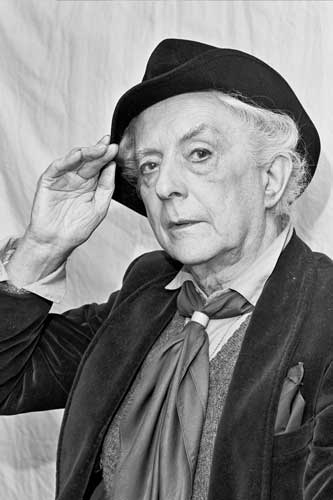QUENTIN CRISP, English author bon vivant, raconteur, born (d. 1999); born Denis Charles Pratt, Crisp was an English writer, artist’s model, actor and raconteur known for his memorable and insightful witticisms. He became a Gay icon in the 1970s after publication of his memoir, The Naked Civil Servant, brought to the attention of the general public his defiant exhibitionism and longstanding refusal to conceal his sexuality.
The successful screening of The Naked Civil Servant launched Crisp in another new direction: that of performer and lecturer. He devised a one-man show and began touring the country with it. The first half of the show was an entertaining monologue loosely based on his memoirs, the second half was a question and answer session with Crisp picking the audience’s written questions out at random and answering them in an amusing manner. In 1978 Crisp sold out the Duke of York’s Theatre in London, then took the show to New York., where he eventually decided to move.
His first stay there, in the Hotel Chelsea, coincided with a fire, a robbery, and the death of Nancy Spungen. He set about making arrangements to move to New York permanently and in 1981 he arrived with few possessions and found a small apartment in Manhattan’s Lower East Side.
He continued to perform his one-man show, published ground-breaking books on the importance of contemporary manners as a means of social inclusivity as opposed to etiquette, which socially excludes, and supported himself by accepting social invitations and writing movie reviews and columns for U.S. and U.K. magazines and newspapers.
He said that provided one could exist on peanuts and champagne, one could quite easily live by going to every cocktail party, premiere and first night to which one was invited. As he had done in London, Crisp allowed his phone number to remain listed in the Manhattan telephone directory and saw it as his duty to converse with anyone who called him.
For the first twenty or so years of owning his own telephone he habitually answered calls with the phrase “Yes, God?” (“Just in case,” he once said.) Later on he changed it to “Oh yes?” in a querulous tone of voice.
In addition to his listed phone number, he accepted dinner invitations from almost anyone. While it was expected that the inviter would pay for dinner, Quentin Crisp did his best to “sing for his supper” by regaling his hosts with wonderful stories and yarns much as he did in his theatre performances. Dinner with him was said to be one of the best shows in New York.
